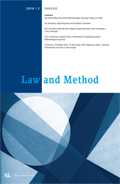|
Developing the capacity for moral judgment is an essential professional competence for lawyers. What teaching and learning activities in the law curriculum can be used in order to contribute to students’ moral reasoning and moral judgment? Four teaching methods were tried out in the period 2019 to 2021 at the Utrecht University School of Law: teaching methods that either work with (hypothetical) dilemmas (I); in-class reflection papers (II); experiential learning based on own experiences in a simulation situation (III); or clinical teaching in a real law firm (IV). The effects of these methods on the development of moral reasoning were measured using the Defining Issues Test (DIT). Additional information on the effectiveness and utility of the method was gathered using semi-structured interviews with teachers. The DIT results were compared at the beginning and at the end of the courses and related to the teaching methods. This article presents the outcomes of this study and formulates some recommendations for further research on the topic. |

| Artikel |
|
| Keywords | moral reasoning, legal education, scholarship of teaching and learning, defining issues test |
| Authors | Emanuel van Dongen and Steven Raaijmakers |
| AbstractAuthor's information |
| Artikel |
|
| Keywords | legal philosophy, research methods, interdisciplinary research, conceptual analysis |
| Authors | Sanne Taekema and Wibren van der Burg |
| AbstractAuthor's information |
|
Many doctrinal legal research questions require making use of other academic disciplines or perspectives. This article explains the relevance of legal philosophy for doctrinal research projects. Often legal research questions have conceptual or evaluative dimensions that presuppose philosophical understanding. For research on the concept of democracy, the function of constitutional rights, or the possible introduction of a referendum in the Netherlands, questions of a philosophical nature need to be answered. Legal philosophy can supplement and enrich doctrinal research in various ways. In this article, we present seven purposes that legal philosophy may serve in the context of a doctrinal research project: conceptual clarification, exposition and reconstruction of fundamental normative principles and values, theory building, providing creative perspectives, structural critiques, evaluation, and recommendations. For each objective, we illustrate how to use relevant philosophical methods. Thus, this article complements our earlier publication ‘Legal Philosophy as an Enrichment of Doctrinal Research – Part I: Introducing Three Philosophical Methods’.1x http://www.lawandmethod.nl/tijdschrift/lawandmethod/2020/01/lawandmethod-D-19-00006. Noten
|


